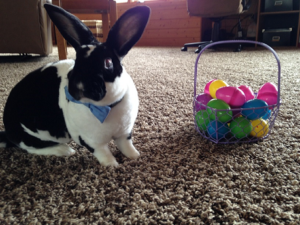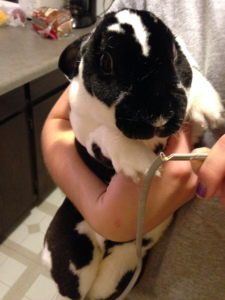Rabbit Care
Easter is  upon us and with that comes it’s furry little mascot “The Easter Bunny”. Some people are tempted to purchase a rabbit for themselves or their children this time of the year. However, having a domesticated rabbit as a pet can be more than people bargain for; they require just as much attention and care as a dog and a cat.
upon us and with that comes it’s furry little mascot “The Easter Bunny”. Some people are tempted to purchase a rabbit for themselves or their children this time of the year. However, having a domesticated rabbit as a pet can be more than people bargain for; they require just as much attention and care as a dog and a cat.
Veterinary Care
Yes, your rabbit will need veterinary attention throughout his/her 8-12 year life span. Rabbits are still recommended to be spayed and neutered. Spaying a female reduces the risk for reproductive cancers such as mammary and uterine. Neutering your male will lengthen his life and make him less aggressive towards you and other animals. Your altered rabbit will also be easier to litter box train and is less likely to urinate around the house. It is also important to check in with your veterinarian to make sure your rabbit is getting a proper diet, has properly trimmed nails, and to check dental health.  A rabbit’s incisor teeth never stop growing. It’s important to make sure they are wearing them down on hay and chew toys. Some rabbits require their teeth to be trimmed on a regular basis by a Veterinarian.
A rabbit’s incisor teeth never stop growing. It’s important to make sure they are wearing them down on hay and chew toys. Some rabbits require their teeth to be trimmed on a regular basis by a Veterinarian.
Grooming
Aside from your rabbit’s teeth and nails, their haircoat will also need some help being maintained. Brushing should be done regularly as rabbits tend to shed. Long-haired rabbits may need to have their hair cut and matts removed. Never cut your rabbit’s hair with a scissors as you risk lacerating the skin. Bathing is not recommended as they can get very stressed and a wet rabbit can become hypothermic very quickly. Keeping a clean cage and litter box is the best way to have a clean pet.
Housing
An outdoor cage is not recommended as rabbits are very sensitive to heat, cold, and sunlight. There are also several predators that are tempted to attack small mammals. Even if your cage is secure, the rabbit can still pass away from the fear/stress of a predator. Several rabbits around the world live cage free in homes like cats and dogs. These rabbits are litter box trained and live in rabbit proof homes where they cannot chew cords and are trained not to chew on baseboards, walls or furniture. When having an indoor cage the bigger is better! You can purchase cages and you can also find D.I.Y. cages online which can turn out bigger, less expensive, and overall better for your rabbit’s enrichment. A wire floor cage is not recommended for rabbits as the wire can injure their feet and legs. Rabbits are natural chewers so providing proper chewing materials such as cardboard boxes, apple branches, compressed timothy cubes, and untreated wood will help wear down their teeth and also limit chewing on unwanted surfaces.
Diet
General rabbit food comes in the form of pellets, but that should really be a small part of their diet (¼ – ½ cup for every 6 lbs of body weight). They need unlimited access to TIMOTHY hay (not alfalfa). Leafy green vegetables are very important to a rabbit’s
small part of their diet (¼ – ½ cup for every 6 lbs of body weight). They need unlimited access to TIMOTHY hay (not alfalfa). Leafy green vegetables are very important to a rabbit’s
digestive tract. Also, even though rabbits are known for their love of carrots, the number of carrots they get needs to be limited. Carrots, other non-leafy greens, and fruits are high in sugar and should be given in moderation as treats and not as a main meal. A full list of acceptable fruits and vegetables can be viewed at rabbit.org.
Adopting Your Rabbit
If you decided you have the time, patience, and means for having a rabbit as a pet, please have these considerations in mind when choosing your pet. Never capture a wild rabbit to keep as a pet. It is unlikely they will survive in captivity, let alone be tamed to allow handling. Always check your local Humane Society first before contacting a pet store or breeder. There are a surprising amount of domesticated rabbits in shelter that need a good home. There are many different breeds, sizes, hair lengths, and colors to consider. Another great resource for new rabbit owners on behavior and care tips is bunnybunch.org.